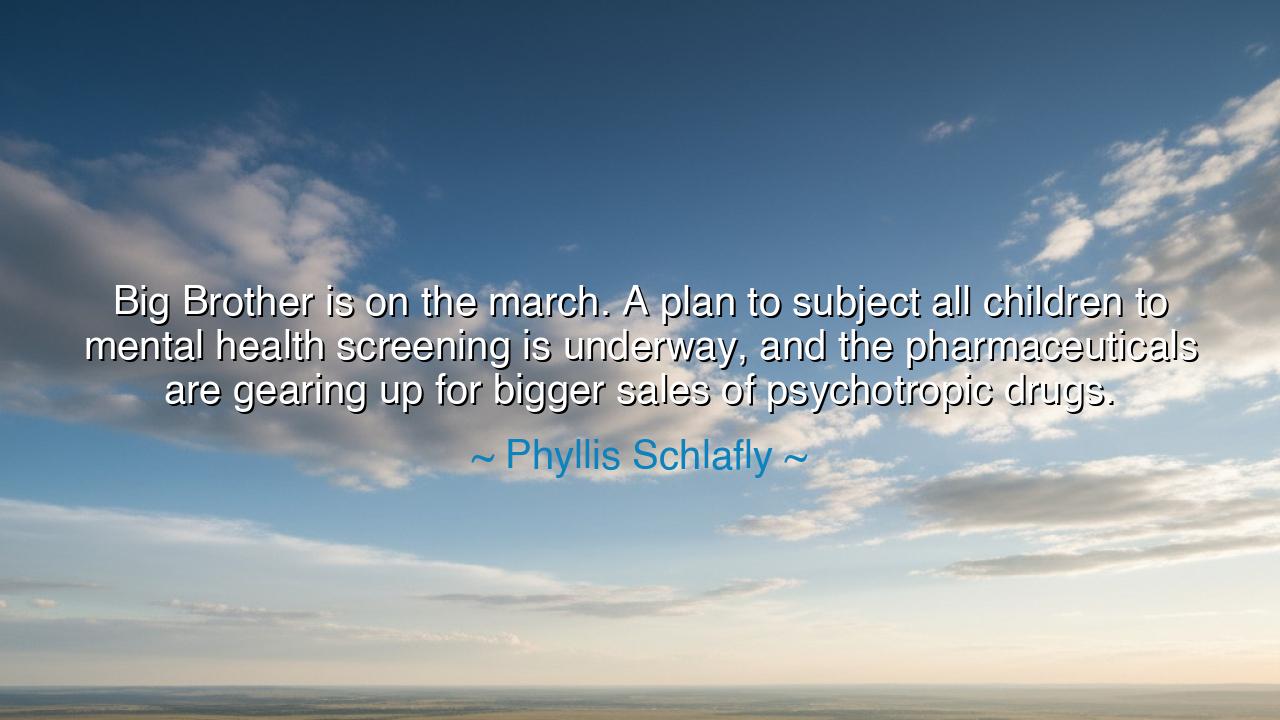
Big Brother is on the march. A plan to subject all children to
Big Brother is on the march. A plan to subject all children to mental health screening is underway, and the pharmaceuticals are gearing up for bigger sales of psychotropic drugs.






In the solemn warning of Phyllis Schlafly, one of the most ardent defenders of liberty in the modern age, we hear these striking words: “Big Brother is on the march. A plan to subject all children to mental health screening is underway, and the pharmaceuticals are gearing up for bigger sales of psychotropic drugs.” Her voice, fierce and unyielding, calls across the years as both a cry and a caution — a reminder that freedom, once surrendered to control, is not easily regained. Her words summon the image of “Big Brother,” the all-seeing force of George Orwell’s 1984, a symbol of tyranny masked as protection, of control disguised as care. Schlafly saw, in her own time, the creeping shadow of such power — not in chains or armies, but in systems clothed with benevolence and bureaucracy.
Phyllis Schlafly, a lawyer, writer, and activist, was known for her unwavering defense of individual sovereignty and parental authority. When she spoke these words, she was addressing the growing influence of government and corporate interests in matters of personal and family life — particularly the mental health screening of children, a policy she feared could open the door to mass surveillance, labeling, and dependency on pharmaceutical control. She saw the rise of psychotropic drugs not merely as medicine, but as instruments of conformity — a means by which the human spirit could be dulled, the rebellious heart pacified, and the independent mind subdued. Her words were not a rejection of care, but a plea for vigilance: that compassion must never become a tool for control, and that in the name of safety, we must not trade away freedom.
The phrase “Big Brother is on the march” evokes the ancient warning of all who have lived beneath the shadow of tyranny. The Romans once said that “liberty dies not with a sword, but with silence.” In Schlafly’s view, the danger lay not in open oppression, but in the slow, subtle erosion of autonomy — the quiet expansion of institutions that decide for us what is “normal,” what is “healthy,” what is “acceptable.” She saw in the movement toward universal mental health screening the risk of reducing children — the most innocent among us — to data points, to diagnoses, to consumers of medicine rather than beings of potential and soul. To be watched is to be diminished, she warned, for the child who grows up under constant scrutiny learns not to think freely, but to conform.
History bears witness to her caution. In the twentieth century, the promise of “scientific progress” was too often twisted into instruments of control. In Soviet Russia, dissenters were once labeled as mentally ill and confined to psychiatric hospitals — their desire for freedom redefined as delusion. In Nazi Germany, eugenic programs masqueraded as public health, claiming to improve society while extinguishing its diversity. Schlafly, steeped in the lessons of history, understood how the language of care can mask the will to dominate. She saw that the alliance between state power and corporate profit — in this case, the partnership between government screening and pharmaceutical expansion — could become a subtle yet powerful chain upon the human mind.
Yet, her words are not merely an accusation; they are a call to courage and awareness. “Big Brother” need not triumph if the people awaken. She reminds us that the health of the spirit is as sacred as the health of the body — that while medicine may heal wounds, only freedom can nurture the soul. The wise, she teaches, must discern between help and control, between compassion and coercion. It is the duty of each generation to guard against the comfortable slavery that comes when dependence replaces discipline, when surveillance replaces trust, and when profit replaces principle.
To understand Schlafly’s warning is to recognize the fragile balance between progress and liberty. She was not opposed to knowledge or healing, but to blind faith in systems that lack accountability. For every invention that promises improvement, there must be a moral compass to guide it; for every policy that seeks to protect, there must be vigilance to ensure it does not enslave. The mind — especially the mind of a child — is sacred ground, and to allow it to be governed by unseen hands is to risk the very essence of what it means to be human.
Let the lesson of her words be this: freedom demands awareness. Question what you are told is “for your own good.” Seek truth not in the slogans of authority, but in the still, quiet reasoning of conscience. Guard the innocence of the young not only from harm, but from control disguised as care. Build systems that empower, not those that pacify. For if courage is lost and vigilance forgotten, “Big Brother” — whether in the form of government, corporation, or ideology — will indeed march forward unopposed.
And so, children of tomorrow, heed this warning of the past: freedom is not inherited; it is defended. Each generation must rise anew to protect it — not with weapons, but with wisdom; not through rebellion alone, but through awareness and integrity. For only those who keep their minds unchained and their hearts awake can build a world that is both compassionate and free. In this balance lies our true health — and in this truth, the eternal victory of the human spirit over every power that seeks to own it.






AAdministratorAdministrator
Welcome, honored guests. Please leave a comment, we will respond soon